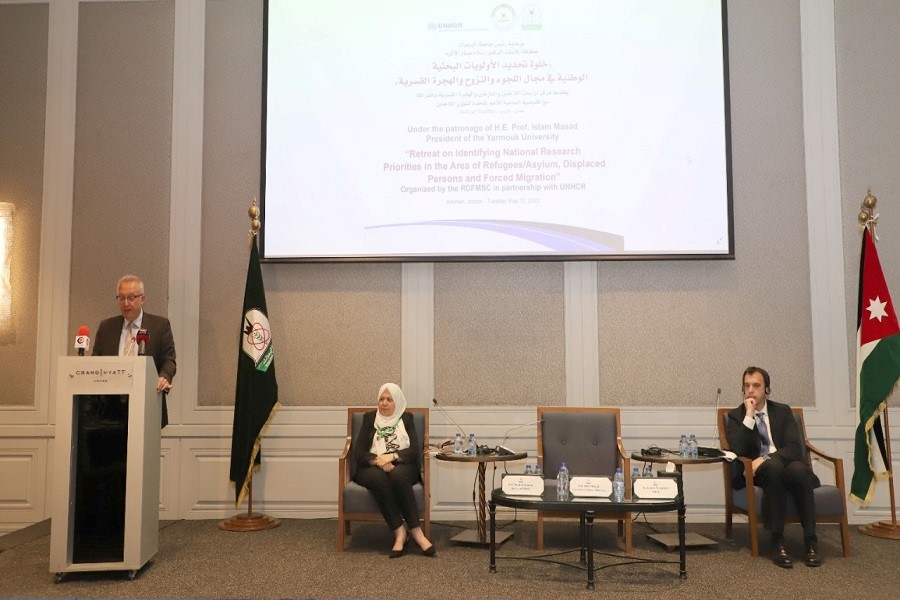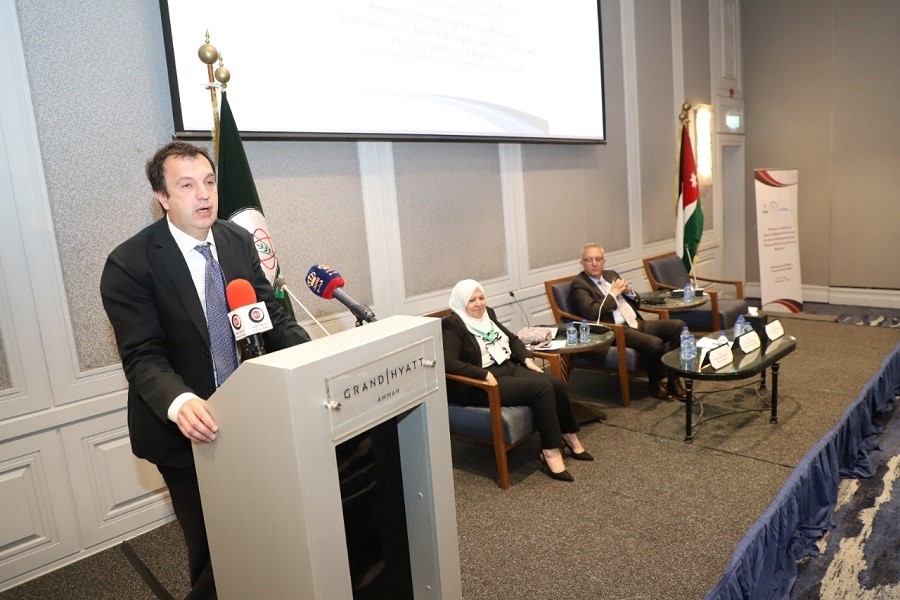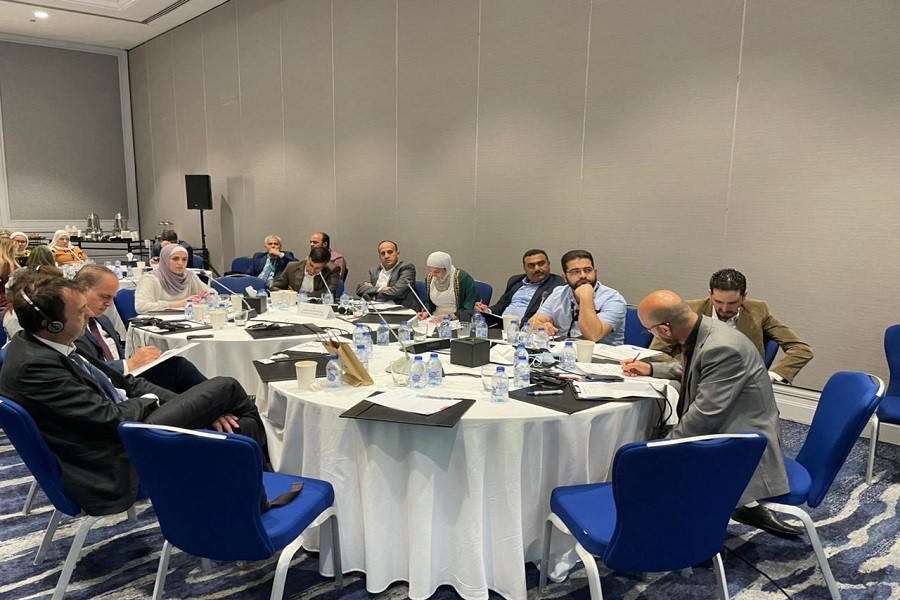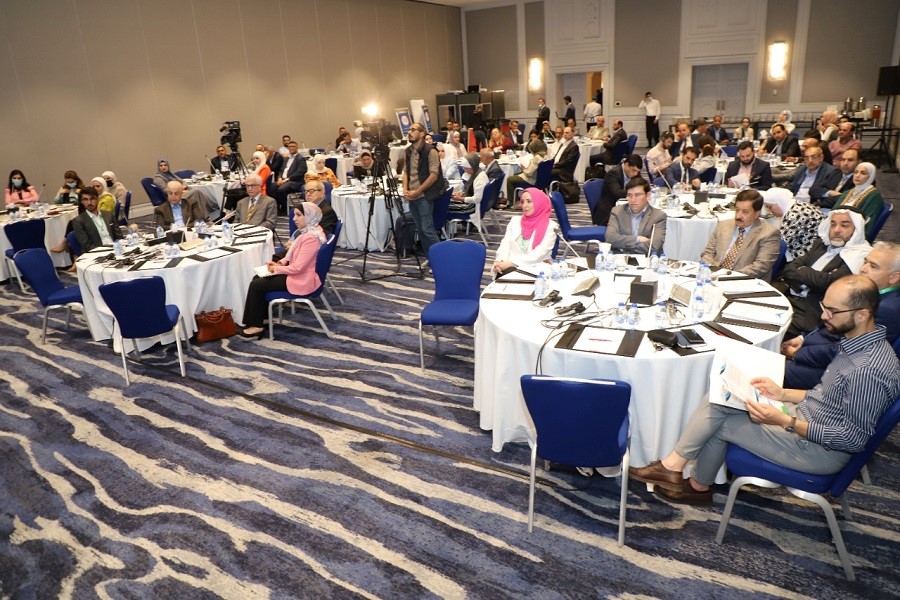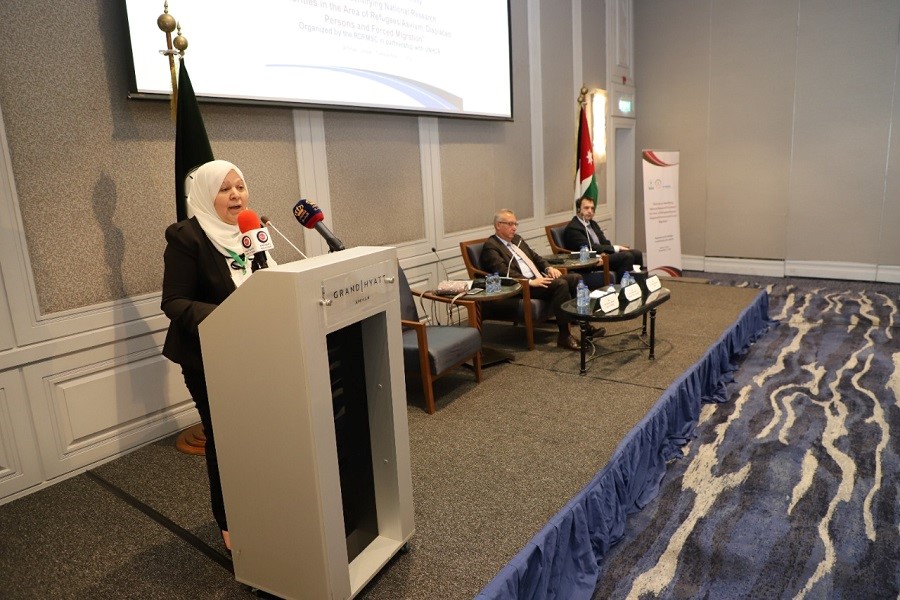
The President of Yarmouk University Prof. Islam Massad sponsored the events of "a retreat of setting research and national priorities in the field of asylum, displacement and forced migration" in Amman which has been organized by the Centre for Refugee Forced Migration Studies at Yarmouk University, in partnership with UNHCR.
Massad stressed during his opening speech, in the presence of UNHCR Representative in Amman Daniele Tessandori. We are meeting in this national retreat which includes an elite of experts, specialists and researchers in the field of refuge and its various issues to discuss multiple aspects and different angles. This aims at giving an answer of an important question in the field of scientific research which is where to start from? And how do we proceed? Especially, because we are dealing with an issue has high sensitivity and privacy, which is "asylum".
He also stressed that the keenness of Yarmouk University to carry out its mission not only at the level of preparing scientific competencies in various fields of science and knowledge, but it also takes care of scientific research production which its results reflect in local and international communities and serve human beings wherever they are. It does not abandon them and their issues. Its approach is to implement its projects and research within a comprehensive national strategy.
He added: from this sense, the center's team has initiated this activity which is distinguished by the presence of qualitative partners. They are capable to guide the track of scientific research in the fields of asylum and migration to a place where it must be. This is within a serious national vision and clear road milestones.
Massad pointed out that Yarmouk University has paid great attention to the activities and events of the Center for Refugee and Displaced Persons Studies and Forced Migration. This is based on its absolute belief that universities must provide the homeland with what can make it capable to face the challenges such as asylum and its associated challenges, crises and complex problems that reflect in the social, economic and political realities of societies. It goes beyond that to influence the future which we want to be better than the reality. We are seeking to serve our societies and homelands in order to achieve the directive of the wise Hashemite leadership. This generous Hashemite homeland has borne the consequences of asylum and its effects since its inception. It will continue to be a safe haven and destination for all those who have been lured by circumstances to leave their homelands.
Tessandori expressed the UNHCR support and appreciation for the efforts that Jordan has made and still providing towards refugees. Jordan has taken the facade role in dealing with this humanitarian issue. He stressed that this Jordanian role is appreciated by UNHCR through Jordan's keenness to keep its doors open to receive large regiments of these refugees. He also appreciated the kingdom's positive approach towards the refugee file which is distinguished by its extending over decades throughout history. He pointed out that today we are not looking for cooperation with Jordan on the issue of refugees as much as we look at what we have both done on this subject. We have established a very large base to work together in order to develop ourselves. He pointed out that UNHCR is always seeking for strengthen coordination and enhancing response on refugee and asylum issues in general.
added that this specialized retreat represents an opportunity to link the academic field and scientific research further in relation to practical aspects in terms of refugee issues in the field-based. He Expected to come up with a road map at the end of this retreat’s activities aimed to apply and translate this vision practically. Especially as this meeting brings together practitioners on the ground, academics and authorities to participate in this vision about asylum issues. This enshrines a common goal between the Jordan and UNHCR.
Prof. Reem Al-Kharouf, the Director of the Center for Refugee, Displaced persons and Forced Migration Studies, confirmed that this retreat came after months of hard working and preparation to build a national base to work with refugees and for them. This is based on the center's vision which derived from the philosophy of Yarmouk University's mission. At that time, the most significant question was “Are we able to work in a distinct way based on study, planning and active participation?” And “Are we able to reach results worthy of the reputation of our university and our country?”
She added that the answer of this question was “yes we can” in case we had a clear road map towards the goal we want to achieve. These are qualitative research that serve the country and develop one of our tools. So, the idea of building specialized research priorities for asylum and forced migrations was born. Researchers can benefit from this idea in our Arab region and the worldwide in a way it is determined by specialists.
Al-Kharouf pointed out that refugees in the world do not only need support and assistance, but they also need research and study which make their way accessible for building the reality that they want. We are able to take this step despite all the challenges that we face. In the sessions of this retreat, many topics were discussed such as axis the health, medical and psychological sciences and the axis of the economy, food and water security, innovation and leadership. Also, the axis of communication and information technology, the axis of humanities, social sciences and information, the focus of future studies and the global system and the challenges of the future have been discussed as well as the axis of environmental studies and the axis of legal protection for refugees in international and national legislation.
The retreat recommended a set of recommendations at the end of the its sessions. The most notably recommendation is providing a comprehensive health database for Jordanians and refugees in details including primary health care, and studying the levels of change in social stigma and their relationship to access to psychological services. It also recommended that the role of refugees in the development of the host country's economy and labor market should be strengthened instead of being a burden on it. Participants also recommended investing technology in protecting environmental systems in refugee assembly areas, studying the importance of research in environmental psychology, and the participation of refugees in social development. In terms of legal protection of refugees in international and national legislation, the retreat recommended conducting research studies on finding a local refugee law and providing a study about the duplication of services that provided to refugees and their actual needs in the host community.
